|
A Virtual Walk Through Jacksonville History
Stop 14: Thomas G. and Lucinda Reames House
Almost directly across the street from the Max and Louisa Muller house (Stop #13) was the home of the Thomas and Lucinda Reames family at 540 East California Street. While many details are characteristic of the Queen Anne style, the earliest portion of the house was probably constructed around 1864 and consisted of a simple rectangular structure with a north facing porch across its length. As Reames prospered and grew in prominence, the house grew along with his public stature and family size. The house was added onto and enlarged at least twice after 1867, with the original home probably becoming the lower flower of the east-facing ell. By the turn of the century, it had become one of the more palatial homes in Jacksonville.
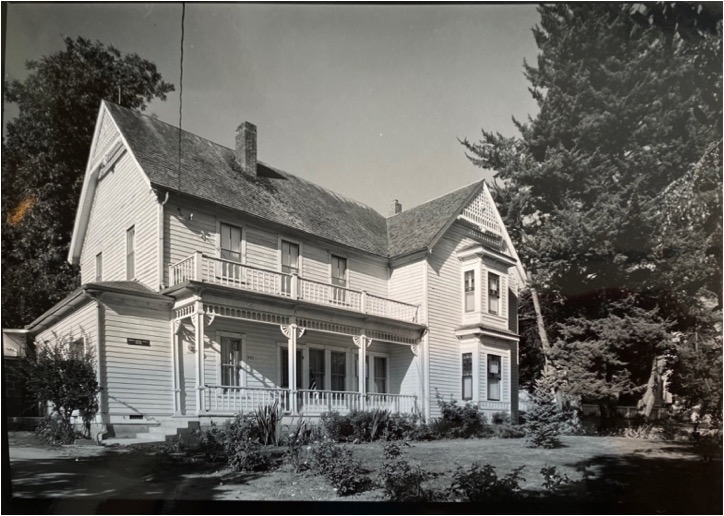 Photo Credit SOHS 29704.1 Photo Credit SOHS 29704.1
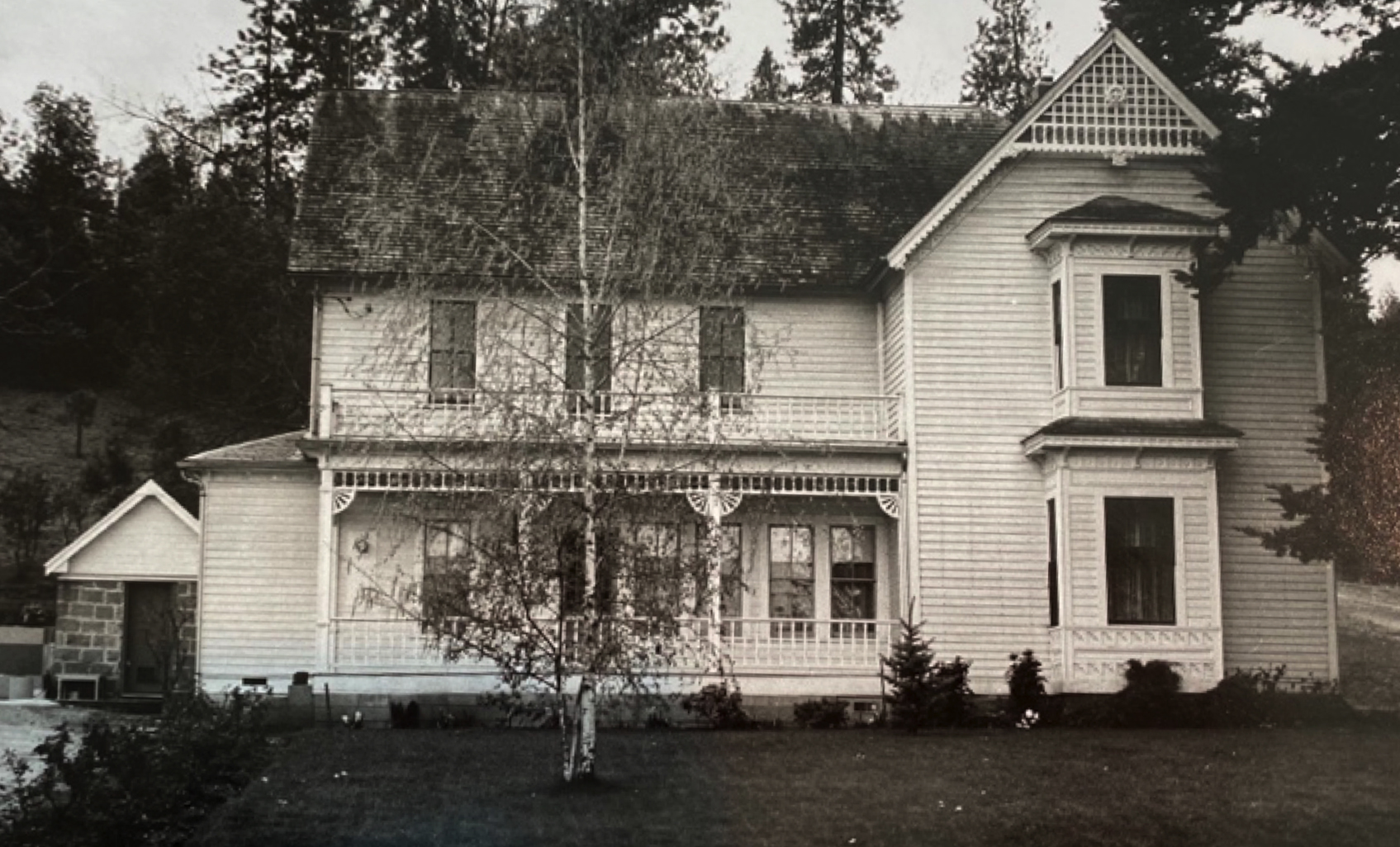 Photo credit: SOHS 5288 Photo credit: SOHS 5288
Thomas Givings Reames was born in Lichfield, Kentucky, in December 1839. In 1852, when his family came seeking the wonders of the far west, Thomas was barely 13 but man enough to drive one of the family wagons in the wagon train they joined to cross the Oregon Trail. After arriving in St. Helens at the conjunction of the Columbia and Willamette rivers, both Thomas and his father went to work for the Hudson Bay Company, loading and unloading boats. But the following spring, learning of the gold and other resources to be found in southern Oregon, his father moved the family to Jackson County. There Thomas’s father took up a donation land claim near what is now Phoenix, opening a blacksmith shop to service travelers while farming his acreage. Thomas helped his father with farm and smithy chores, mining the creeks as time permitted.
By the time he reached his 20s, Thomas had experienced stevedoring, mining, farming and blacksmithing. He appears to have lost his taste for manual labor, and in 1864 he moved to Jacksonville and obtained an appointment as deputy sheriff.
With good prospects and a stable income, Thomas celebrated the Fourth of July of 1866 by marrying Lucinda Williams whom he had courted since moving to town. Her family had emigrated to Oregon from Missouri the same year as Thomas. A month after their marriage, he purchased the lot and its existing house on East California Street on the edge of town and settled in with his bride.
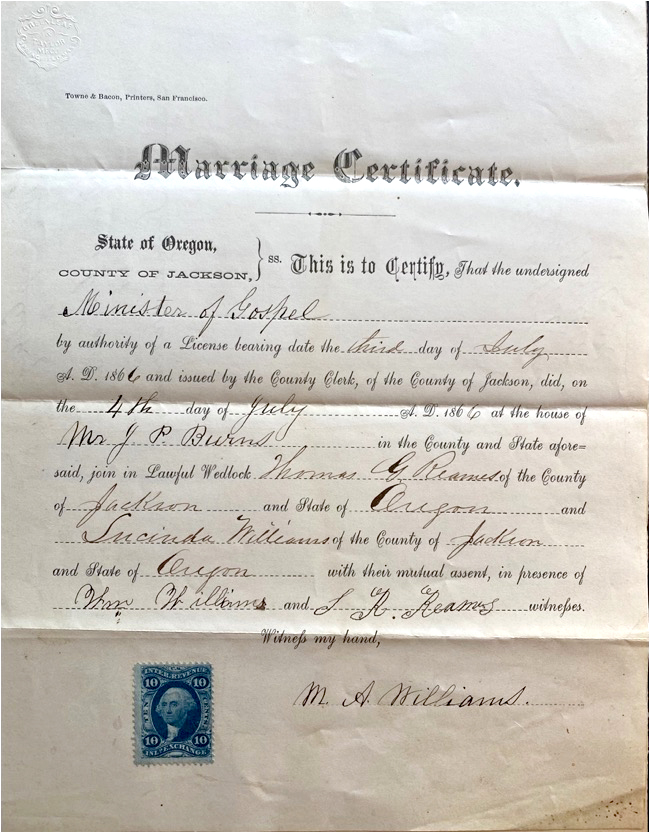 SOHS SOHS
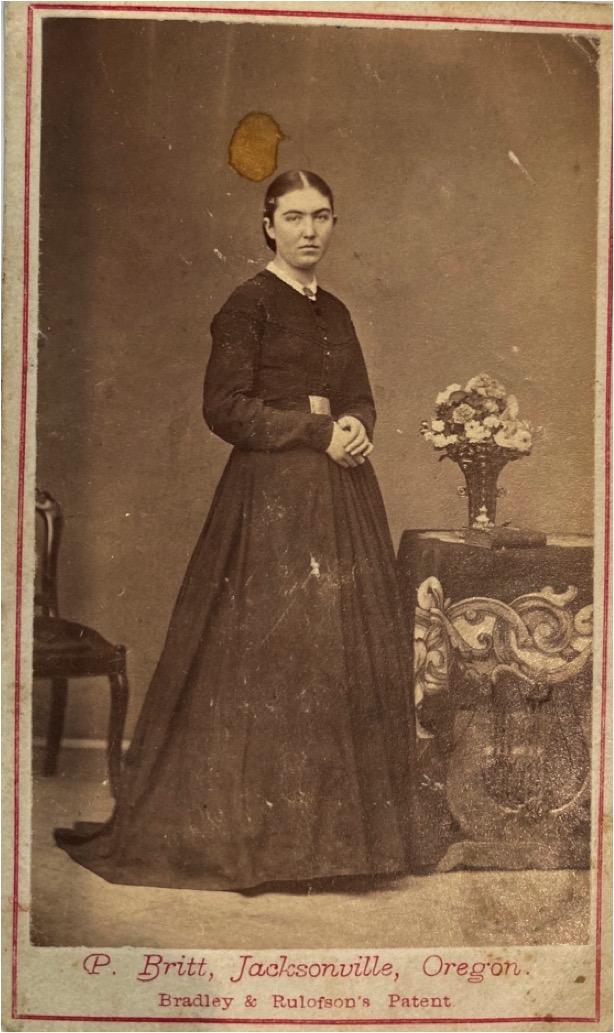 Lucinda Williams Reames, SOHS 21000 Lucinda Williams Reames, SOHS 21000
After serving a four-year term as deputy, Thomas ran for and was elected to a two-year term as Jackson County sheriff. A biographer described his career in law enforcement: “He knew what roughing it meant. He was frequently called upon to ‘tussle’ with law breakers of his region and it is not recorded that he ever came out second best.”
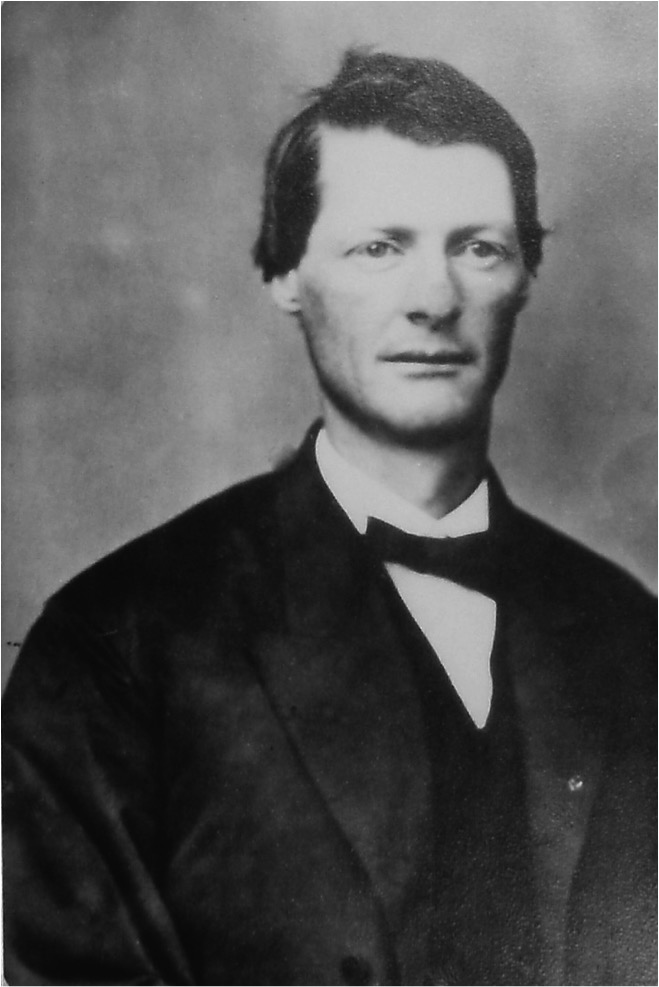 Thomas G. Reames, “Official” Sheriff Portait. SOHS 48418 Thomas G. Reames, “Official” Sheriff Portait. SOHS 48418
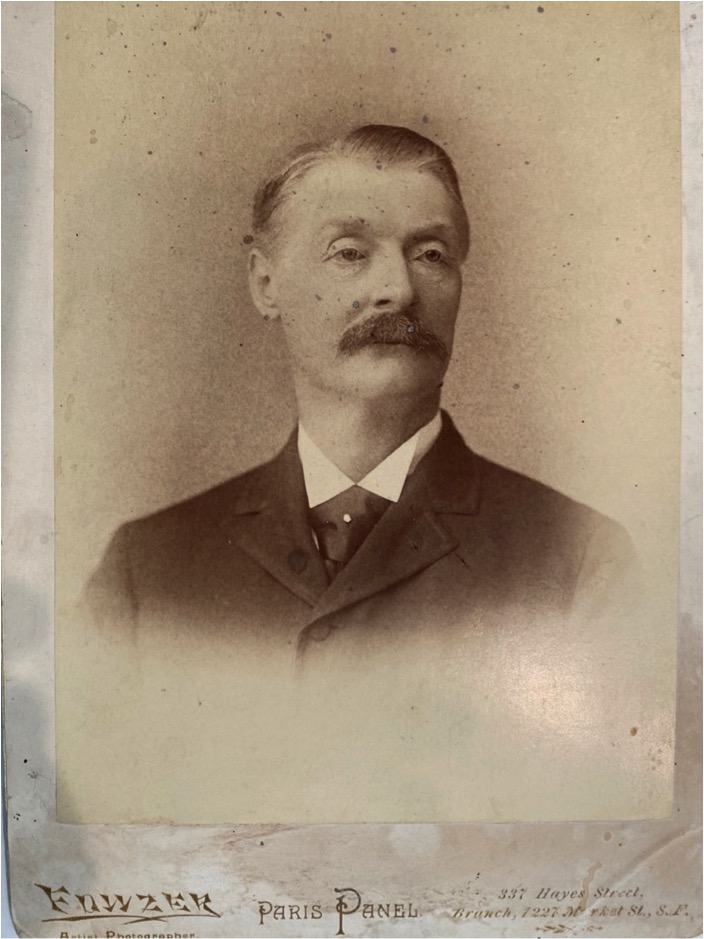 Thomas Reames in later life. SOHS Thomas Reames in later life. SOHS
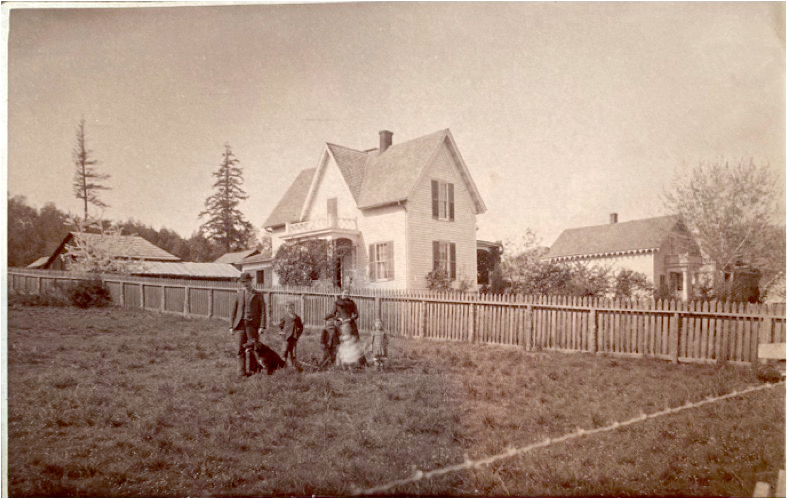 The young Reames family in their yard, with the Beekman House in the background. SOHS 15008 The young Reames family in their yard, with the Beekman House in the background. SOHS 15008
But perhaps having a wife and starting a family gave Thomas second thoughts about “tussling with law breakers.” At any rate, he chose not to run for sheriff again and when his term expired, he purchased the Union Stables and opened a livery business at the corner of California and 4th streets, the site of today’s Umpqua Bank.
Although he could handle the blacksmithing, Thomas had not anticipated the costs of maintaining an adequate stock of carriages, wagons, coaches, and even a second-hand hearse. The strain on his resources was too great. He gave up the enterprise and established a general merchandise store near his old home in Phoenix in partnership with Ben Sach, formerly a partner with his brothers in Jacksonville’s Sach Brothers “Temple of Fashion.”
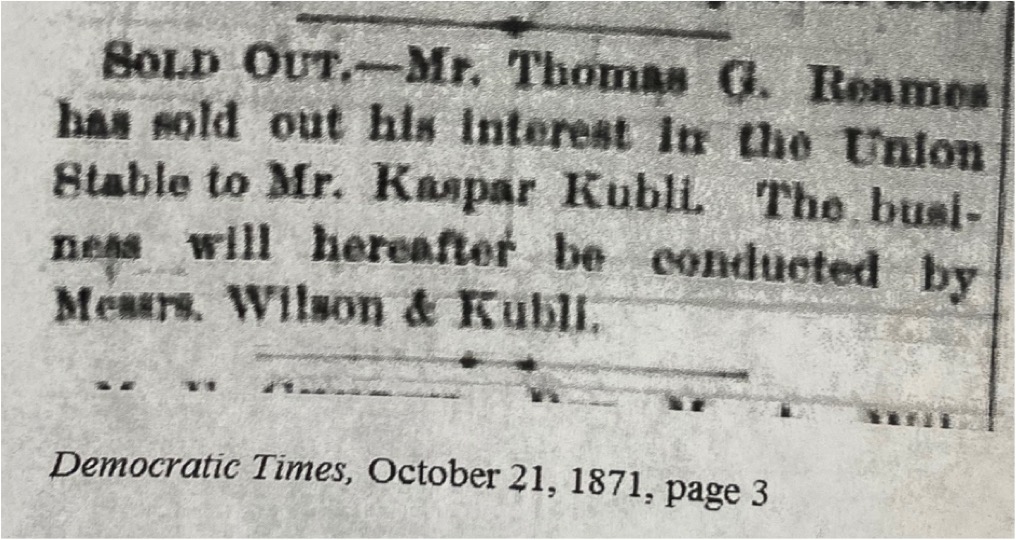
Thomas had a knack for the mercantile business. After four years operating Reames and Sach, he joined forces with his brother Evan Reames. They purchased the stock and goodwill of the firm White and Martin in Jacksonville and opened Reames Brothers on California Street in the site of the old “Temple of Fashion,” today’s Pot Rack.
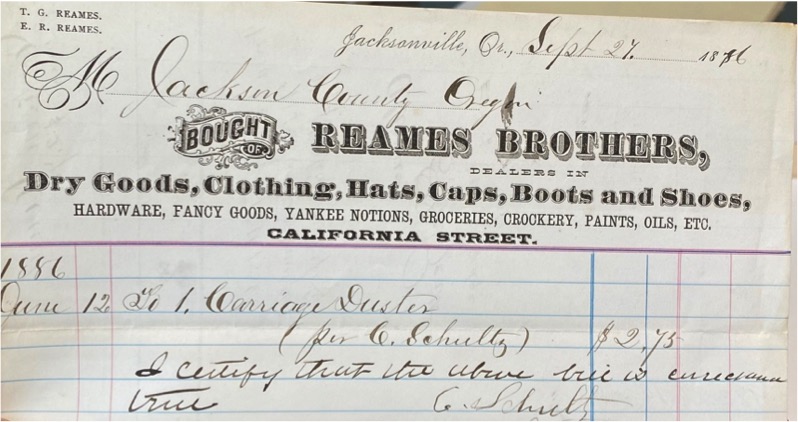 SOHS SOHS
Reames Brothers became one of the most profitable mercantile stores in Southern Oregon. It proved so successful, that in 1881 they opened a second store in Linkville, now Klamath Falls, with Evan Reames in charge. They also stocked what might now be considered a PX or “post exchange” at Forth Klamath. The three outlets supplied settlers, miners, and the U.S. Army with goods and foodstuffs.
Then in 1887, Thomas gave up the mercantile business. Perhaps he was tired; perhaps he was looking for new challenges; perhaps he anticipated a political appointment. At any rate he went into banking and partnership with his neighbor, Cornelius Beekman. Banking proved to be another very profitable enterprise, and Beekman and Reames did very well, also handling County warrants (bonds) and investing in real estate. During much of that period, Reames was the face clients would see behind the counter as family business took Beekman on extended trips to the East Coast. Even after Reames died, the business name of Beekman and Reames continued to appear on the institution’s checks, stationery, and business cards.
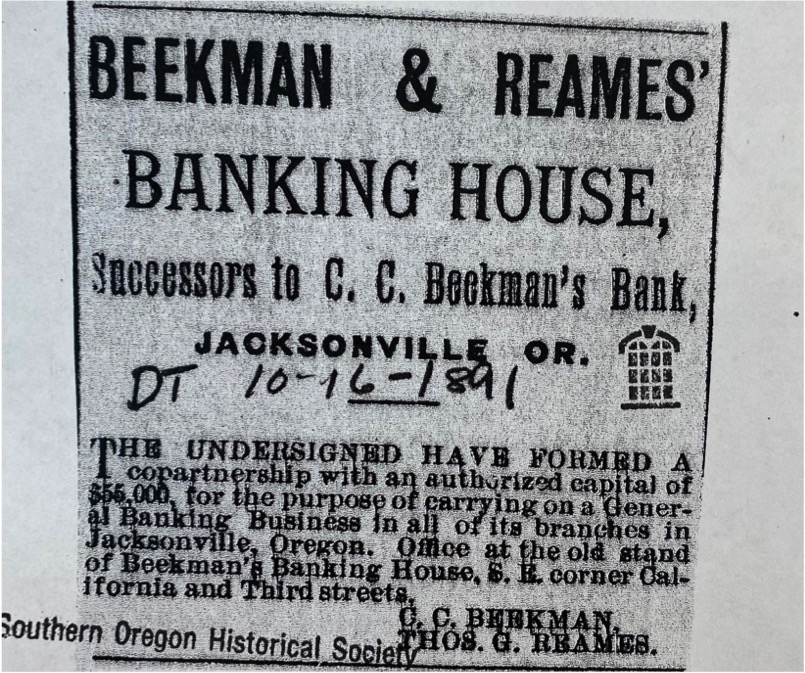 SOHS SOHS
Business was just one aspect of Thomas’ life. His sheriff’s election had given him a taste for politics and Reames became very active in the Democratic Party. He served multiple terms on the Jacksonville City Council, including several stints as mayor. In 1878, Governor W.W. Thayer appointed him brigadier general of the first brigade of the Oregon militia, and Thomas subsequently became known as General Reames. That same year he was the Democratic candidate for Secretary of State, losing by only 191 votes.
Thomas was a delegate to the Democratic National Convention of 1892 that nominated Grover Cleveland for President. When Cleveland became the first Democrat elected to the position since the Civil War, he appointed Thomas as Postal Inspector for Oregon, Washington, Idaho, Montana, and Alaska. Thomas served for 18 months but found the position “not to his liking” and resigned. At the time of his death, he was Superintendent of Schools.
Thomas was also one of the most prominent members of the Oregon Masonic fraternity. A 32nd degree Mason, he was Worshipful Master of Jacksonville’s Warren Lodge No. 10, a charter member and Eminent Commander of the Ashland Lodge, and Grand Master of all the Oregon lodges. In those capacities, he laid the cornerstone of the historic Jackson County Courthouse, now Jacksonville’s city offices.
The nine surviving Reames sons and daughters continued the family legacy. The Reames name became synonymous with law, politics, banking, agriculture, merchandising, and society.
Unfortunately, Thomas’ death did not befit his status. Thomas suffered from nasal catarrh, similar to a sinus infection. Local doctors were unable to address the condition so in 1900 he went to Portland for surgery. The surgery was successful, but upon his return to Jacksonville, he caught a cold. Infection set in and he died shortly there afterwards, only 61 years old. His funeral was one of the largest and most imposing held in Jacksonville.
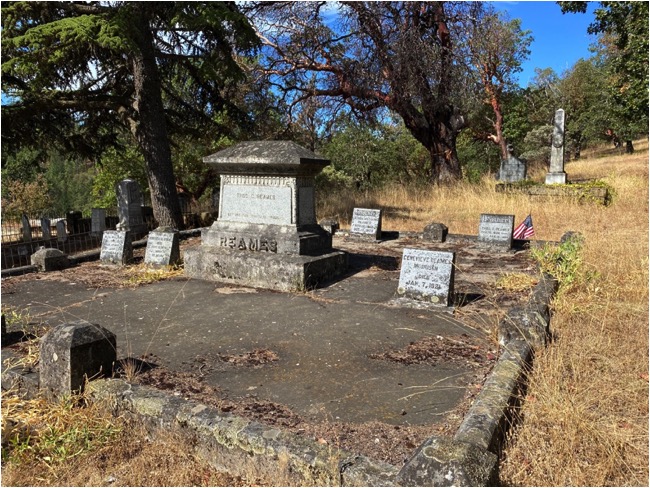
Sources and References:
Evans, Gail E.H. “Thomas Reames House.” State of Oregon Inventory of Historic Properties, March 1980.
Kingsnorth, Carolyn. “Thomas G. Reames. Capitalist, Politician, Self-Made Man.” Jacksonville Review, June 2018.
|